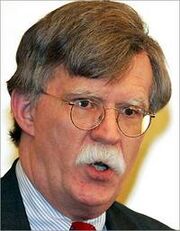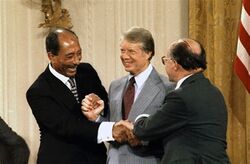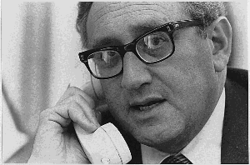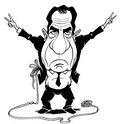Henry Kissinger
“This [expletive deleted] viciously stole all the [expletive deleted] fame properly reserved for the President!”
Henry (born Heinz) Alfred Kissinger (May 27, 1923 – November 29, 2023) is the most notorious bore of 20th-century international politics and the chief proponent of Realpolitik. He developed an approach to diplomacy called Primat der Außenpolitik and an approach to language involving sprinkling pretentious foreign words everywhere. His unintelligible advice baffled both Richard Nixon and thus certainly Gerald Ford, the two U.S. Presidents under whom he served between 1969 and 1977. His call for détente in U.S.–Soviet relations sent leaders of both nations to the dictionary, hoping it meant something dirty. His diplomacy played a crucial role in 1971 talks with Chinese Premier Zhou Enlai that concluded with a rapprochement between Kissinger and a lot of hot Chinese chicks. In the crowning achievement of his career, he was awarded the 1973 Nobel Peace Prize for talking Nixon out of his last-ditch plan to win the Vietnam War by carpet-bombing Stockholm.
Kissinger's speaking voice is so grating that he stopped traveling to many countries for fear of retribution. Spanish judge Baltasar Garzon declared his books and television appearances a war crime and a crime against humanity.
Early life

Kissinger was born in Fürth, Bavaria, Germany. The family took its surname from the baths at Bad Kissingen, a bad place to be bad, but a decent place to wash up. The pudgy youth liked to play soccer, most often serving as the ball.
Kissinger vividly recalled the 1933 election of Adolf Hitler when Kissinger was nine. Historians wrestle to explain how Nazism had a profound influence on Kissinger's career, although he explained how it did not. However, during the Hitler years, Kissinger's soccer team often went up against the Hitler Youth, and they kicked him harder than ever. He often defied the new Anti-Semitism laws by sneaking into professional soccer matches. He would later write that the Germany of those days "had a lot of order and very little justice", which is a high-falutin' way of saying that at least Herr Hitler made the trains run on time. Finally weary of being arrested on suspicion of Walking While Big-Nosed, the family emigrated. They briefly stopped in England, though a day-trip to Edinburgh led them to conclude that the Fürth of Forth "did not feel like home at all". They wound up in the Washington Heights district of Manhattan, New York, same notation. Kissinger assimilated except for that ponderous German accent. Wikipedia tells us it persisted because he was reluctant to talk, but that is no reason the little bugger couldn't listen, is it?
Kissinger's youth is a Horatio-Algeresque, rags-to-riches tale of night school while working during the day and pulling himself up by the bootstraps. However, though he managed to avoid being bossed around by the Nazis, he would not avoid being bossed around entirely: In 1943, his adopted nation drafted him into the Army.
Military service
Kissinger entered Basic Training in South Carolina. The Army viewed him as a decent security risk despite sounding like Hitler's press aides, and he became a U.S. citizen. Finally, they realized he was a fluent speaker of German and reassigned him to Military Intelligence, which was as big an oxymoron in those days as it is today. Kissinger saw combat with that division — primarily fighting his office-mates over who gets the World section of the day's newspapers — and volunteered for hazardous memo-writing. His intractably poor physique got him sent to the Battle of the Bulge.
When the Third Reich was defeated, Kissinger was put in complete charge of the German town of Krefeld, as the townspeople would not obey his colleagues even when they barked out orders in perfectly clear English. Within a week, he got all the abandoned cars towed away and collected fines on overdue library books. Kissinger had the power of arrest but was a soft touch. He recalled that bossing Krauts around "made me feel like an American".
After the war, he earned scads of degrees at Harvard, writing a thesis that was 400 pages long, ponderous, turgid, and unreadable. He was promoted and eventually given a Ph.D. in a process that is often cited as proof of the Peter Principle. His doctoral dissertation, Peace, Legitimacy, and the Equilibrium overcame the faults of his previous works, as it was merely unreadable.
It is said that "Those who can, do; those who cannot, teach" and it is a good thing that Kissinger chose the latter and remained at Harvard as a professor, because what he taught was the utility of frequently using small nuclear weapons to win minor wars.
Influencing the U.S. Government
Kissinger had wanted to be a spy for years. Perhaps in training, he kept this aspiration so secret that no job offers arrived. However, starting in 1956, he pursued the much more lucrative role of being a consultant to various spy agencies.
In 1960, wanting greater influence in U.S. foreign policy, he hitched his wagon to Nelson Rockefeller, Harold Stassen being a longer-running loser but not needing policy white-papers written. He met Richard Nixon in 1967 and would go on to say that Nixon "was not the numbskull I expected", though he still called him "the most dangerous man to be President". Kissinger worked for Rockefeller for a third time in the 1968 campaign, which Nixon won. Kissinger was distraught at this outcome but, rather than waiting until 1972 to see if Rockefeller could get it right, called Richard Allen and promised to do "anything I can" to help Nixon win — perhaps not run naked down Pennsylvania Avenue, as Kissinger still had a big gut.

Kissinger did not streak, and Nixon did win, and immediately saw Kissinger's potential and appointed him National Security Advisor. Soon, Kissinger was also serving as Secretary of State, blatant double-dipping that continued after Nixon resigned and Vice President Gerald Ford was upgraded to President. Ironically, Rockefeller then was selected the Vice President — and everyone was listening to Kissinger and no one was listening to Rockefeller.
Celebrity
Kissinger became a flamboyant celebrity despite being unfathomably dull. At the height of his popularity, he was regarded as an A-list sex symbol.
His biography is replete with episodes of opening secret negotiations with despots America was at war with, conniving to cut the State Department out of the loop, and playing solitaire rather than notifying the President that something noisome was about to hit the fan in a foreign hot-spot. But cooking up huge Condors in East Timor, Cambodia, and South America, and prolonging the skullduggery in Vietnam, only heightened his prestige.
However, when Jimmy Carter took office in 1977, his first action was to hand Kissinger his dénouement and send him packing — to K Street, where he formed Kissinger Associates, an international computer-dating scam that provided hookers for Congressmen.
In his later years, Kissinger came under fire for comments made during the Indo-Pakistan War in which he described Indians as "bastards", their Prime Minister Indira Gandhi as a "slobbering bitch", and the entire planet as "a stinking pit vut should be blown up immediately mit lots of nuclear bombs". In 1972, he famously told Italian journalist Oriana Fallaci he had no interest in team play, fixed principles, or public approval. He would go on to "regret" those comments, so among all the issues on which Kissinger took a middle ground, one must include Kissinger himself.
Shuttle diplomacy

Kissinger's trademark was "shuttle diplomacy", which meant flying to one of the world's simmering cauldrons of hate and conducting in-person back-and-forth "negotiations" with all parties on their own turf. Shuttle diplomacy coincided with the dawn of the era of Frequent Flier miles — the con the reader has surely plied as well, as he travels ten times on business and gets a free round-trip for himself, which was paid for by his employer being overcharged. Kissinger would visit the White House Travel Office and say he preferred to fly on PanAm (and hand them his personal card to swipe). He set the record for whirlwind peace treaties (as the record book doesn't deduct anything when they unravel after you return to the U.S.), but the networks raved about his record for miles traveled.
Death
In 2023, Kissinger reached 100 and opened bilateral negotiations and engaged in shuttle diplomacy with both God and Satan. The American public placed bets on which side would prevail. Fatefully, on November 30, 2023, Kissinger passed immigration and customs en route from this world to the afterworld.
Kissinger's official hagiographer, Niall Ferguson, called Kissinger "one of the most important theorists in the history of the United States — no, make that the human race." However, taxpayers who for years paid Kissinger's extravagant airfare, just so he could announce that "piss is at hant" days before the enemy stormed the embassy and most of the Americans had to be airlifted out, fervently hope he will "rest in piss".
See also
| ||||||||||||||||||||
| Featured version: 04 June 2024 | |
| This article has been featured on the main page. — You can vote for or nominate your favourite articles at Uncyclopedia:VFH. | |



